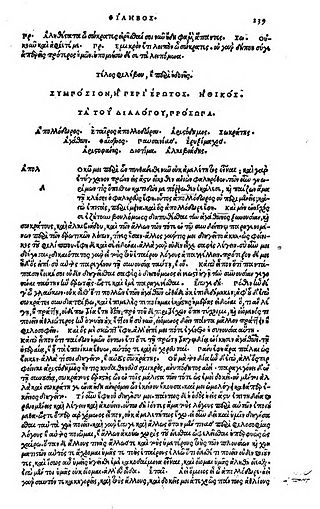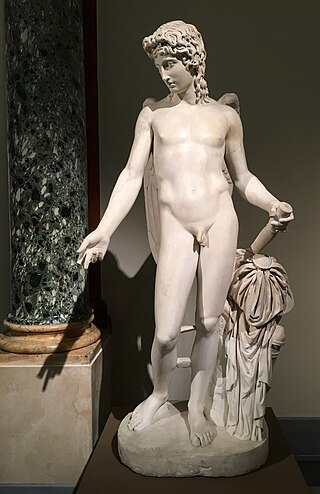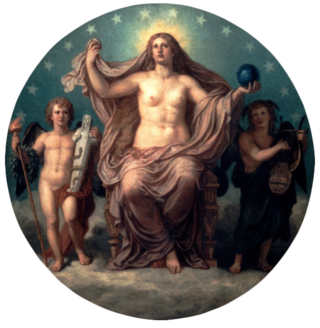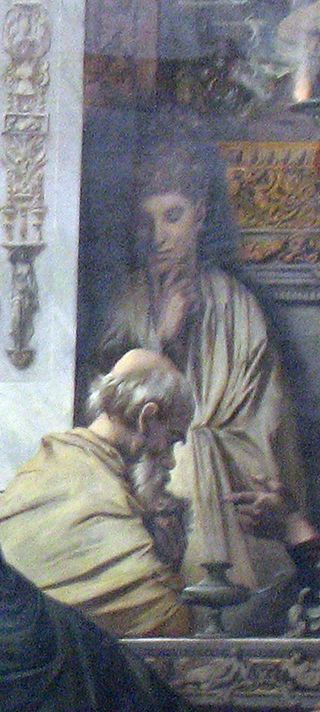
Aphrodite is an ancient Greek goddess associated with love, lust, beauty, pleasure, passion, procreation, and as her syncretized Roman goddess counterpart Venus, desire, sex, fertility, prosperity, and victory. Aphrodite's major symbols include seashells, myrtles, roses, doves, sparrows, and swans. The cult of Aphrodite was largely derived from that of the Phoenician goddess Astarte, a cognate of the East Semitic goddess Ishtar, whose cult was based on the Sumerian cult of Inanna. Aphrodite's main cult centers were Cythera, Cyprus, Corinth, and Athens. Her main festival was the Aphrodisia, which was celebrated annually in midsummer. In Laconia, Aphrodite was worshipped as a warrior goddess. She was also the patron goddess of prostitutes, an association which led early scholars to propose the concept of "sacred prostitution" in Greco-Roman culture, an idea which is now generally seen as erroneous.

Agathon was an Athenian tragic poet whose works have been lost. He is best known for his appearance in Plato's Symposium, which describes the banquet given to celebrate his obtaining a prize for his first tragedy at the Lenaia in 416. He is also a prominent character in Aristophanes' comedy the Thesmophoriazusae.

In Greek mythology, Anteros is the god of requited love and also the punisher of those who scorn love and the advances of others, or the avenger of unrequited love. He is one of the Erotes.

In ancient Greek religion and mythology, Plutus is the god and the personification of wealth, and the son of the goddess of agriculture Demeter and the mortal Iasion.
The following is a family tree of gods, goddesses, and other divine and semi-divine figures from Ancient Greek mythology and Ancient Greek religion.

The Symposium is a Socratic dialogue by Plato, dated c. 385 – 370 BC. It depicts a friendly contest of extemporaneous speeches given by a group of notable Athenian men attending a banquet. The men include the philosopher Socrates, the general and statesman Alcibiades, and the comic playwright Aristophanes. The panegyrics are to be given in praise of Eros, the god of love and sex.

Aphrodite Pandemos occurs as an epithet of the Greek goddess Aphrodite. This epithet can be interpreted in different ways. In Plato's Symposium, Pausanias of Athens describes Aphrodite Pandemos as the goddess of sensual pleasures, in opposition to Aphrodite Urania, or "the heavenly Aphrodite". At Elis, she was represented as riding on a ram by Scopas. Another interpretation is that of Aphrodite uniting all the inhabitants of a country into one social or political body. In this respect she was worshipped at Athens along with Peitho (persuasion), and her worship was said to have been instituted by Theseus at the time when he united the scattered townships into one great body of citizens. According to some authorities, it was Solon who erected the sanctuary of Aphrodite Pandemos, either because her image stood in the agora, or because the hetairai had to pay the costs of its erection. The worship of Aphrodite Pandemos also occurs at Megalopolis in Arcadia, and at Thebes. A festival in honour of her is mentioned by Athenaeus. The sacrifices offered to her consisted of white goats. Pandemos occurs also as a surname of Eros. According to Harpocration, who quotes Apollodorus, Aphrodite Pandemos has very old origins, "the title Pandemos was given to the goddess established in the neighborhood of the Old Agora because all the Demos (people) gathered there of old in their assemblies which they called agorai." To honour Aphrodite's and Peitho's role in the unification of Attica, the Aphrodisia festival was organized annually on the fourth of the month of Hekatombaion. The Synoikia that honoured Athena, the protectress of Theseus and main patron of Athens, also took place in the month of Hekatombaion.

Eros is a concept in ancient Greek philosophy referring to sensual or passionate love, from which the term erotic is derived. Eros has also been used in philosophy and psychology in a much wider sense, almost as an equivalent to "life energy". The Protestant philosopher C. S. Lewis posits it as one of the four ancient Greek words for love in Christianity, alongside storge, philia, and agape.
There are related mythological figures named Porus or Poros (Ancient Greek: Πόρος "resource" or "plenty") in Greek classical literature.
Plutus is an Ancient Greek comedy by the playwright Aristophanes, which was first produced in 388 BCE. A political satire on contemporary Athens, it features the personified god of wealth Plutus. Reflecting the development of Old Comedy towards New Comedy, it uses such familiar character types as the stupid master and the insubordinate slave to attack the morals of the time.

Diotima of Mantinea is the name or pseudonym of an ancient Greek character in Plato's dialogue Symposium, possibly an actual historical figure, indicated as having lived circa 440 B.C. Her ideas and doctrine of Eros as reported by the character of Socrates in the dialogue are the origin of the concept today known as Platonic love.
Ptocheia or Ptokheia was the ancient Greek female spirit of beggary. She was regarded as a companion of Penia and Amechania. Her opposites were Euthenia and Ploutos.

In Greek mythology, Eros is the Greek god of love and sex. His Roman counterpart is Cupid ('desire'). In the earliest account, he is a primordial god, while in later accounts he is described as one of the children of Aphrodite and Ares and, with some of his siblings, was one of the Erotes, a group of winged love gods.

Aphrodite Urania was an epithet of the Greek goddess Aphrodite, signifying a "heavenly" or "spiritual" aspect descended from the sky-god Ouranos to distinguish her from the more earthly epithet of Aphrodite Pandemos, "Aphrodite for all the people". The two were used to differentiate the more "celestial" love of body and soul from purely physical lust. Plato represented her as a daughter of the Greek god Uranus, conceived and born without a mother. Hesiod described this aspect as being born from the severed genitals of Uranus and emerging from the sea foam.
Philosophy of love is the field of social philosophy and ethics that attempts to describe the nature of love.

In Ancient Greek religion and mythology, the Erotes are a collective of winged gods associated with love and sexual intercourse. They are part of Aphrodite's retinue. Erotes is the plural of Eros, who as a singular deity has a more complex mythology.
In Greek mythology, Nicaea or Nikaia is a Naiad nymph of the springs or fountain of the ancient Greek colony of Nicaea in Bithynia or else the goddess of the adjacent lake Ascanius. She is the daughter of the river-god Sangarius and the mother-goddess Cybele. By the god of wine, Dionysus, she mothered Telete (consecration) and Satyrus, as well as other children.
Eighteen Epigrams are attributed to Plato, most of them considered spurious. These are short poems suitable for dedicatory purposes written in the form of elegiac couplets.

Aristodemus of Cydathenaeum was an ancient Athenian follower of the philosopher Socrates. He is best remembered as a character and narrative source in Plato's Symposium, and is also preserved in Xenophon's Memorabilia and a fragment from Aristophanes.
In Greek, means the evening meal, usually the largest meal of the Ancient Greek day. One famous example from the Ancient Greek sources is "Hekate's Deipnon" which is, at its most basic, a religious offering meal given to the Titan Hekate and the restless dead once a lunar month. Ancient Athenians held that once a lunar month, Hekate led the spirits of the unavenged or wrongfully killed accompanied by hounds from the underworld up from Hades. It is also the last day of the month according to the lunisolar based Attic calendar used in ancient Athens. Where the time of the dark moon was seen as the in-between liminal time between months.